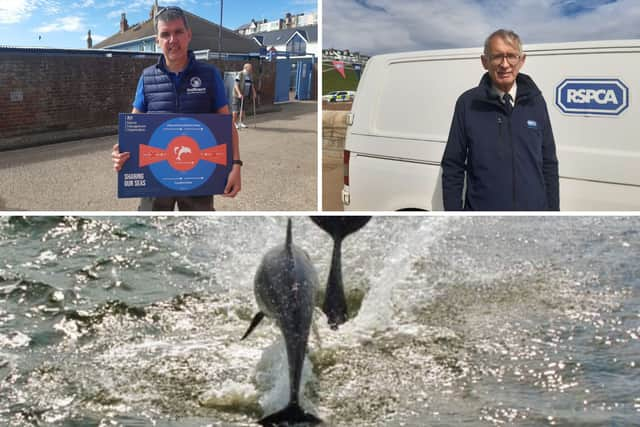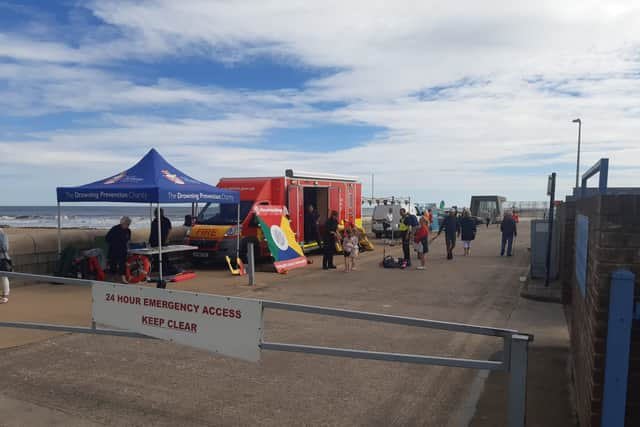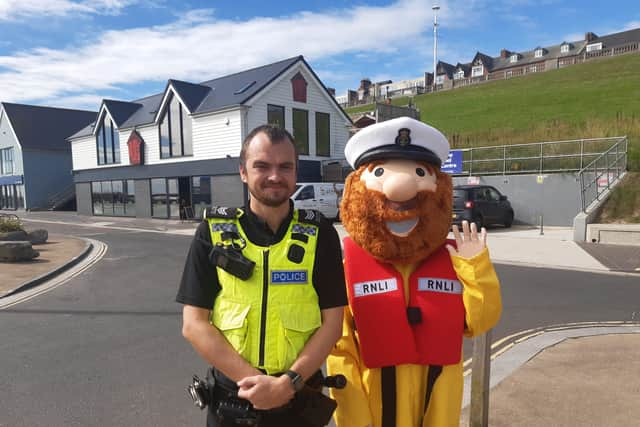Watch as experts issue 'keep your distance' warning to Roker watersports enthusiasts disturbing dolphins in Sunderland
and live on Freeview channel 276
Wildlife experts are concerned by a worrying increase in watersports enthusiasts and beach goers disturbing marine wildlife such as dolphins.
Today, August 9, wildlife authorities and the police hosted Operation Seabird at Roker Pier to educate people about the dangers of disturbing dolphins and other animals in the harbour after an increase in the number of worrying cases of people scaring the animals or interfering with their natural behaviour.
Advertisement
Hide AdAdvertisement
Hide AdIn recent years there has been an increase in marine life, particularly dolphins and porpoises in the harbour.
With more people in the sea taking part in watersports it has led to an increased number of people looking to get close to the wild animals which experts say could disturb their natural hunting and mating patterns of behaviour.
There has even been a number of social media groups established to notify people when the dolphins are seen off the coast and in the harbour.
One of the organisations taking part in the operation was Seascapes, a lottery funded project promoting and looking to protect the natural, industrial, cultural and maritime heritage of the North East coastline from Tyne and Wear to the Tees.
Advertisement
Hide AdAdvertisement
Hide AdVolunteer officer Michael Burn said: “There are more and more bottle nose dolphins and porpoises being seen in the harbour as they seem to be coming closer to the shore for feeding, including between the two piers.
“However, there has also been an increasing number of incidents of paddle boarders, kayakers, boats and even swimmers following them and getting too close, which can disturb the dolphins and other wildlife.
“Speaking to the police, they have been getting calls from members of the public, concerned that up to 20 paddleboarders are lined up in the harbour looking to see the dolphins.
“The wall created from a gathering of vessels can cause stress to the dolphins who may mistake it for a predator.
Advertisement
Hide AdAdvertisement
Hide Ad“This can change their behaviour and force the dolphins to change their food foraging which can lead to them missing out on food which can cause associated health problems.
“It can also disturb mating and resting patterns.
“It’s also about protecting people’s safety, particularly swimmers when they look to follow the dolphins. These are big four metre long powerful animals.”


While wanting people to enjoy any chance encounters with marine life, Seascapes were joined by the Marine Management Organisation in warning people to adhere to certain rules, including where possible, maintaining a 100 metre distance.
Michael said: “We are really lucky with the marine life we get along our coastline which also includes white beaked dolphins and Minke Whales.
Advertisement
Hide AdAdvertisement
Hide Ad“Seeing these creatures in the wild can be a fantastic experience, and we don’t want to stop that, but where possible, people should maintain a 100 metre distance.
“If you are out kayaking or paddleboarding, you don’t necessarily need to change your course, but what we are asking people is to not change their course and paddle towards the dolphins or other marine life and not to cause them to change their course.
“These are very inquisitive animals and if they want to, they will approach you.”
Other organisations with stalls and representatives on the seafront were the Environment Agency, Inshore Fisheries and Conservation Authorities, the Coast Project and the RSPCA.
Advertisement
Hide AdAdvertisement
Hide Ad

RSPCA national wildlife coordinator, Geoff Edmond, said: “Today is about bringing together partner organisations for a day of action to raise awareness and the need for greater responsibility when close to wildlife at the coast.
“When it comes to dolphins and porpoises, people really shouldn’t be getting closer than 100 metres.
“We are coming to the end of the breeding season, and we also get a lot of seabirds nesting on local beaches and cliff lines.
“People need to remember to keep dogs on leads and not to disturb nesting birds as if they do, parents may not return to the nest.
Advertisement
Hide AdAdvertisement
Hide Ad“People should enjoy seeing wildlife but need to act responsibly and keep a safe distance.”
One of the key partners involved in organising Operation Seabird was Northumbria Police, highlighting that under the Wildlife and Countryside Act, disturbing protected animals, including dolphins, is actually a criminal offence.


Sergeant Pete Baker, of Northumbria Police, said: “We are privileged to see a varied amount of marine wildlife around our area. While we know most people show care and respect towards animals on our region’s coastlines, it is important that everyone is aware of how their behaviour could impact them and that deliberately disturbing wildlife is actually a criminal offence.
“Operation Seabird is all about education and brings together a whole host of expertise so we can raise further awareness about the sensitivities that creatures in our waters can face. Through positive engagement, we can work together with the public to ensure that all marine wildlife can remain undisturbed in their natural habitats.”
Also represented at the event were Tyne and Wear Fire and Rescue Service and the RNLI who were promoting the importance of water safety.
Comment Guidelines
National World encourages reader discussion on our stories. User feedback, insights and back-and-forth exchanges add a rich layer of context to reporting. Please review our Community Guidelines before commenting.